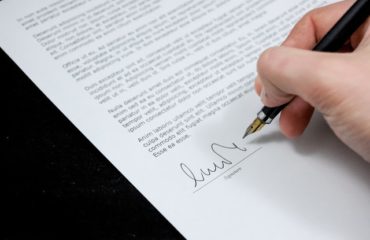
Notarization is the process of verifying and witnessing the identity of an individual signing a document. This process helps ensure that a signature purporting to be from a particular person is authentic and can be trusted. A notary public oversees the proceedings, including verifying ID, confirming the signing party’s capacity and understanding of the document, and ultimately, witnessing the signing of documents. Remember, all lawyers are also notaries public, but not all lawyers offer notarization services.
There are various categories of documents that can be notarized, from personal planning documents to legal documentation.
Here is a shortlist of some documents that can be notarized:
- Passport application documents
- Travel letters for minors
- ICBC or other insurance loss declarations
- Execution or authentication of international documents
- Sponsorship letters
- Statutory declarations
- Government application forms
- Bank declaration forms
Copy certification
Certified copies are verified by a notary public that they are exact replicas of the original document. Almost any document can be certified-copied, including passports, marriage licenses, driver’s licenses, social security cards, birth certificates and medical records. The person in possession of the original document must present it to the notary, who will make a copy of it then place their stamp on it certifying it as a certified copy.
The process of notarization
The process of notarizing involves witnessing the signing of important documents, verifying the identity of the signers and their willingness to sign, their awareness of the contents of the documents and their ability to sign. Let’s take a look at the process.
Identity verification
All parties must have their identity verified by the notary. You must present an original piece of a government-issued photo ID and preferably an additional piece of ID.
Willingness of signers
Once the identity of all parties is verified, the notary public establishes each person’s willingness to sign the documents. On observing the signing of the documents, the notary public will look for any signs of pressure or undue influence. If the notary believes that one party is being forced to sign the presented documents, they will not sign off as witnesses.
Capability to decide and sign documents
Your notary public ensures that you understand what you are signing. In addition, your notary ensures you can confirm what you are signing.
Do you have documents to be notarized? At Bernard Lau & Co., we can assist you with the notarization of English and Chinese documents for use overseas or locally.
The content on this website is provided for general information purposes only and does not constitute legal or other professional advice or an opinion of any kind. Users of this website are advised to seek specific legal advice by contacting members of Bernard Lau and Co. (or their own legal counsel) regarding any specific legal issues. Bernard Lau and Co. does not warrant or guarantee the quality, accuracy or completeness of any information on this website and should not be relied upon as being proper, accurate, timely or fit for any particular individual’s own circumstances other than for educational purposes.
Accessing or using this website does not create a lawyer-client relationship. Although your use of the website may facilitate access to or communications with members of Bernard Lau and Co. via e-mail transmissions or otherwise via the website, receipt of any such communications or transmissions by any member of Bernard Lau and Co. does not create a lawyer-client relationship. Bernard Lau and Co. does not guarantee the security or confidentiality of any communications made by e-mail or otherwise through this website.



